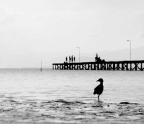To Kill a Horse
 Watercolor by Lucy Pierce. Image via Wellcome Collection.
Watercolor by Lucy Pierce. Image via Wellcome Collection. At that time it could be said that we knew many of the horses in town on a personal level. With little effort I could have told you who owned each one, how they were related to each other, and also what dispositions they had, which ones would let you stroke their velveteen noses and feed them apple slices and which ones my father had told me were known to bite. No doubt the reason we knew the animals so well was because my father was a vet, and so his life and our livelihood were fundamentally entangled with the lives of other creatures. On the days when I was home sick, he would tell me stories about the animals that were his patients, the secret ways in which beings without language could disclose their pains, how he had nursed them back to health, and the lives they had led to fullness afterwards. My engagement with animals was far deeper than that of other children who loved animals but who imagined them mainly through the lens of fables, which after all were stories molded in the form of human society, and gave no thought to animal ways. In the same manner, I referred to the dogs and chickens and pigeons my uncles kept as my cousins, and if my father smiled to hear this, he never corrected me, and I meant this not as a figure of speech but very seriously, because excluding something from the category of family simply because it wasn’t human made no real sense to me. And so I did not believe my Orthodox neighbor when he told us that man held kingship over all animals, and as he explained about the infinite benevolent blessings of Christ, I ran away from him and could hear him cursing me as I did so.
And in the winter in those days, lemons became more expensive and oranges became more expensive and limes became prohibitively expensive and what tomatoes we could find at the market were anemic in color, all water and tasteless, mealy flesh, and to me the yellow-green seeds suspended in jelly that spurted out at the first slice of the knife resembled a thousand insectoid eyes, and I hated them and refused to eat any tomatoes until they were cooked and mashed down into an unrecognizable eyeless paste. Before first frost our father would gather bunches of the herbs in our garden and hang them to dry around our kitchen so that all winter long the hot little room was suffused with the smell of a sunny field, and sometimes I would
You’re reading a preview, subscribe to read more.
Start your free 30 days





